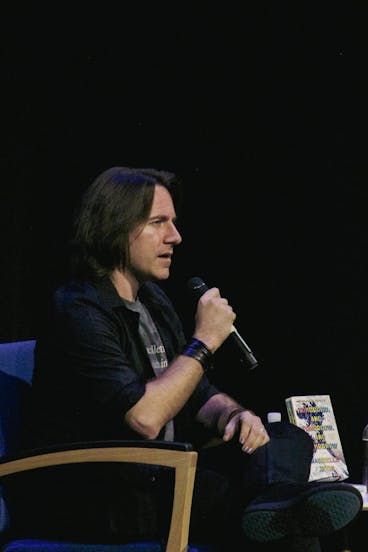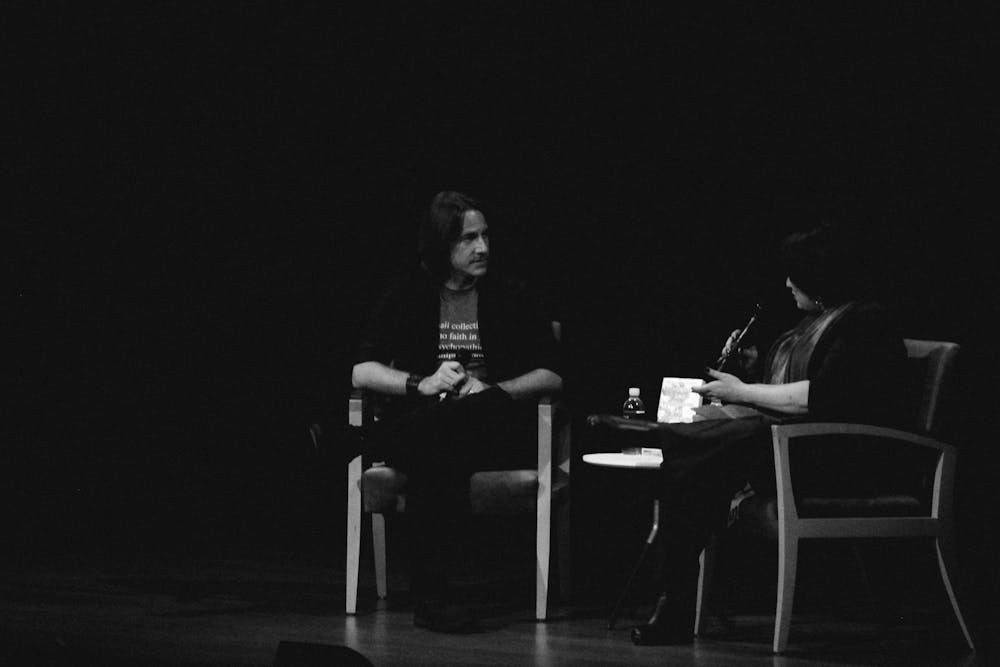
AUBURN, AL. — The Gogue Performing Arts Center was buzzing well before the lights dimmed Thursday evening. By the time doors closed at 6:50 p.m., the lobby had already been filled with fans collecting free copies of Gabrielle Zevin’s novel "Tomorrow, and Tomorrow, and Tomorrow" and stress toys shaped like video game controllers. The event, “Community in Gaming: An Evening with Matthew Mercer,” drew a strikingly diverse crowd of children, college students, and older fans, united by their enthusiasm for tabletop role-playing games and one of its most recognizable voices.
Matthew Mercer, best known as the dungeon master of the globally successful "Critical Role" series, joined Dr. Emily Friedman, associate professor at Auburn University, for a conversation that blended pop culture and academic inquiry. Over the course of two hours, Mercer traced his career from a self-described “shy nerd kid” to a central figure in contemporary gaming, while reflecting on the role of community in storytelling.
Friedman opened with warmth, calling the audience “a sea of nerds,” immediately establishing the tone of camaraderie that permeated the evening. Mercer responded with candor and humor, admitting his discomfort with being on camera despite years of livestreaming with "Critical Role." He spoke about discovering convention culture, cosplay, and the unique connections forged in signing lines, describing them as moments of “mutual sharing” between creator and fan. “It’s an honor I don’t take for granted,” he said.
Mercer described his early path through the gaming industry, beginning not with acting but with production. He tested video games straight out of high school and initially aspired to animation. That behind-the-scenes experience, he explained, gave him an understanding of the complexity of game development. “Every finished project is a miracle,” he remarked, emphasizing the collaboration required to bring a game to life. Transitioning into voice acting, he stressed, required serious acting training. Demonstrating the subtlety of the craft, he described it as “a weird in-between of acting and theater.”
The conversation shifted to Mercer’s career-defining role as a Dungeon Master. Friedman asked whether game mastering constitutes care work, to which Mercer answered affirmatively, noting the parallels to therapy, friendship, and collaborative creativity.
“It was extremely meaningful getting to hear him and Dr. Friedman talk about the importance of play and storytelling in the building of friendships and community,” said Kathryn Duffield, an audience member. “Dr. Friedman made a comment about GMing as care work that stuck with me deeply as someone who loves to see my friends inhabit a world we build together. It was wonderful to hear these two people talk about experiences related to TTRPGs that I can see so clearly reflected in my own life.”
Critical Role, he explained, began as a birthday gift for fellow voice actor Liam O’Brien, an excuse to play a tabletop campaign among friends that unexpectedly blossomed into a cultural phenomenon. Mercer joked that it was “a trick to get people to hang out with me,” but the remark underscored the show’s origins in community rather than commerce.
As he recounted the early days of streaming on Geek and Sundry, Mercer described how little they expected long-form tabletop storytelling to succeed in an internet culture dominated by four- and five-minute videos. They gave themselves an eight-week trial, funding much of the show themselves. Watching the audience grow week by week and seeing the first fan art, Mercer said, was transformative. The breakthrough came with their first major fundraiser, when he realized the community surrounding Critical Role could become “a positive force for change.” Friedman echoed the sentiment: “People make the success.”
Mercer drew connections between tabletop role-playing games and humanity’s oldest storytelling traditions. “It’s a primal experience to tell stories collaboratively,” he said, likening modern sessions to the myths and legends passed down by elders. He emphasized that tabletop games build confidence, foster teamwork and allow people to inhabit personas in ways increasingly rare in the digital age.
The discussion also examined the practical challenges of leading a table. When Friedman asked about running large parties, Mercer joked that it came at “great sacrifice to his sanity,” insisting that five players remain his “golden number.” He compared the improvisational nature of game mastering to jazz: a balance of structure and adaptability. More seriously, he acknowledged the responsibility of not leaving players behind, and the lessons learned from difficult experiences with disruptive participants.
Addressing the pressures of turning passion into profession, Mercer admitted that he is “so grateful and so tired.” Burnout, he said, is “a very human challenge,” and his methods for recovery include music, nature, and losing himself in other creators’ work. He and his wife, fellow performer Marisha Ray, play Stardew Valley together, and he recommended Disco Elysium as a standout narrative game, pointing to the shirt he wore in its honor.
When asked about the future of "Critical Role", Mercer expressed pride about fellow game master Brennan Lee Mulligan, who is leading the newest season. He said he hopes the series ultimately outlives him, explaining that success would mean the community and storytelling endure without his presence. “The human spirit needs to play,” he concluded, returning to the evening’s central theme.
Audience members remained engaged throughout, cheering, laughing, and occasionally shouting in response to Mercer’s anecdotes. Many wore game-related merchandise, while others dressed more formally, underscoring the range of people drawn together by the event. Friedman and Mercer maintained an easy rapport, with Friedman guiding the conversation between lighthearted moments and more serious reflections.
By evening’s end, “Community in Gaming” had lived up to its promise. Mercer’s reflections highlighted not only the mechanics of game mastering and the intricacies of voice acting, but also the cultural significance of play itself. The event underscored what has made "Critical Role" and Mercer’s work resonate so widely: an insistence that storytelling is not a solitary act but a communal one, and that joy is best found when shared.



